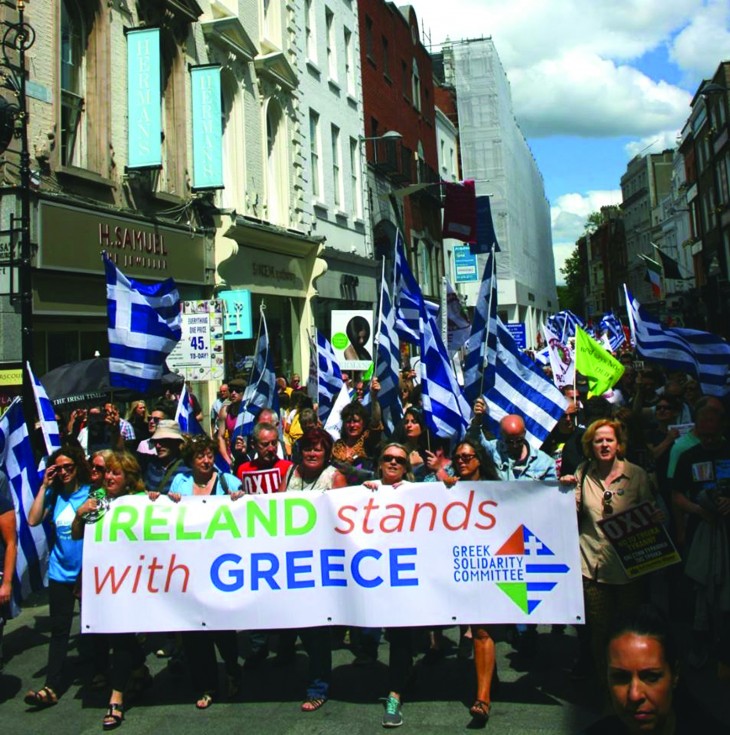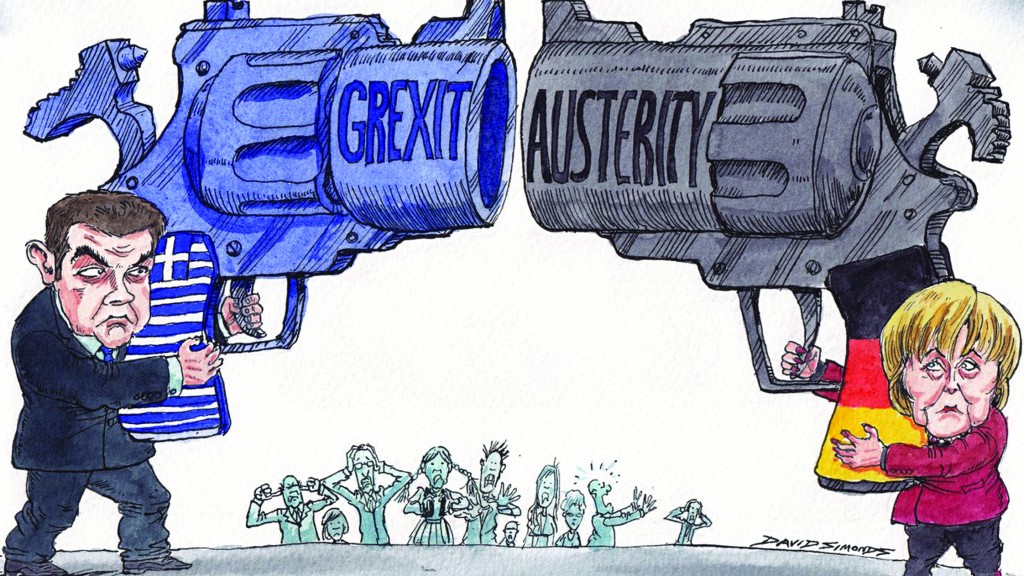In late September 2009 I was walking through Dublin as the city prepared for the rerun of the Lisbon Treaty referendum.
Outside Dublin Castle I ran into canvassers from Generation Yes, a young, liberal, pro-Europe group established early that year to campaign for the passage of the treaty. Drawing them into conversation you could feel the passion of their arguments. They were the Erasmus generation – students and graduates who saw the European Union as an engine of progress for Ireland and a liberator that had broken us from our bleak, parochial past.
Rather than the ‘Yes for Jobs’ vacuities many of the main political parties ran with in the campaign, Generation Yes spoke to direct experience living and working in Europe, or for European businesses in Ireland. Many of its best advocates came from the tech sector and saw the EU as a vanguard project of a globalising world, breaking down borders, encouraging innovation and providing opportunity.
Generation Yes played a crucial role in the landslide victory of 2009. More clearly than any other organisation involved they developed an identity for the Yes camp.
The European Union represented a young, modern, idealistic cosmopolitanism. The No camp, as I remember now-Senator John Crown saying on my local radio station, were the past: “Trotskyite communists and right-wing zealots”.
So, Lisbon II passed, Ireland’s political elite celebrated, and Generation Yes disappeared. But less than a year later the European Union, so long considered a benevolent actor in Irish politics, imposing human rights with a pat on the head from the continent, came to wear a quite different mask. 2010 brought the Troika.
Just five years after its arrival on the scene, the creditors’ union of the European Commission, the European Central Bank and the International Monetary Fund has come to dominate the popular imagination of the European Union. For the peripheral states which they made home, their policies have inextricably linked the project of European integration to falling living standards, crumbling welfare states and debt servitude.
It isn’t an exaggeration to say that a Generation Yes for 2015 is almost impossible to imagine. A group of the same name might intervene in a referendum, it might even attempt to use a similar message, but it would have to reckon with the fact that the sickly-sweet vision of Europe it once sold has been indissolubly mixed with the bitterness of austerity.
It would also have to reckon with a rival identity. Not the eurosceptic Right, an opponent it had always comfortably beaten. But, since 2011, the indignados and Europe’s movement of the squares, a rival, pro-European movement which was highly critical of the Troika and the increasingly undemocratic apparatus of the European Union. Last Sunday, in Greece, this movement was given a name: Generation No.

The price of building up the reputation of the European Union as an arena of opportunity for Europe’s periphery has been the weight of frustrated expectations when this turned out not to be the case. As a result, in most of these states, it isn’t Generation Yes which represents the future but Generation No.
This shift in orientation towards the European project is not down to a turn against Europeanism. In fact, the Greek No vote enjoyed enormous support from across the continent, clearly registered in marches, direct actions, and statements from social movements, trade unions, NGOs, academics and intellectuals.
Instead what has happened is that the European Union has been stripped back to its essence as a neoliberal economic project. Gone are the pretences of common culture or social fabric – the Greek crisis has demonstrated that bonds of solidarity stretch only as far as is profitable.
In truth the European Union was a market-oriented project from its inception. Despite the ‘social Europe’ myth he helped created, Jacques Delors’ success at seducing Europe’s social democrats in the 1980s only served to trap them. First into the 1988 directive mandating extensive free movement of capital and then, in 1992, into the Maastricht Treaty.
These arrangements provided the foundation for the euro – a currency which was to drive the stake of neoliberalism even further into the European Union. The money in our pockets is the most monetarist currency ever designed. No mandate for the ECB to deal with unemployment. No lender of last resort. No framework for debt mutualisation.
It was also forged in class warfare. On its inception wages and conditions in Germany were forced down to create optimal conditions for its export industry. To deal with its first crisis the same has been done to workers in peripheral Europe.
Contrary to what we hear in the media, the cause of this crisis was not profligacy in countries like Greece or Spain. It was twofold – a failure in the international financial system and a failure in European capitalism.
In the former Germany banks took on huge exposure to states like Greece by investing in high-yield bonds. For the business class this meant the availability of credit for Greek consumers – a boon for exporters to Greece. There was also the benefit of a heap of profit from financialising the peripheral economies. In Greece, it led to falling bond prices, cheaper credit and a bubble.
Between 1998 and 2007, Greece had the second highest growth rate in Europe. During roughly the same period Greece’s bond yields fell from over 15 per cent to 3 per cent. There’s an almost direct correlation.
This development was not led by demand from Greece but supply from Germany. In many ways the German business class was the sub-prime mortgage lender of the European financial system. But it has been workers in peripheral European states who paid the price.
To look at the problem as originating solely in the financial system, though, would be wrong. European capitalism relies on the German export economy – and that has run into major difficulties predating the current impasse.
When German labour costs were driven down after introduction of the euro it was as a substitute for increased productivity that couldn’t be achieved. What happened was wage dumping – ie the artificial suppression of wages, to competitive advantage – and if it had been a product rather than wages, under World Trade Organisation rules, that would have resulted in tariffs being placed on German goods.
It didn’t, because the rules actually protect Germany. Instead it was artificially allowed to outcompete southern European states which should have benefited competitively from cheaper labour. They found German surpluses invested speculatively in their economies, temporarily allowing for German exports to be soaked up.
The figures underpinning all this are stark. In the mid-1990s Germany had a small current account deficit – and Greece, Spain, Portugal, Italy and Ireland were all within +/- 3% of GDP. By 2006 Germany’s surplus was approaching 6% while all of the ‘PIIGS’ were in deficit, Portugal, Greece and Spain very significantly so. Germany has kept this level of surplus now for over five years in contravention of the EU’s own rules.
But this model has come to its end. Greeks cannot continue to buy German exports because their banking system is illiquid. Spain, Portugal and Italy, which traditionally import a lot of German goods, are seeing a demand squeeze. Meanwhile Germany is struggling to keep up with the productivity and technological advances of emergent superpowers like China.
The eurozone’s crisis resolution has been an attempt to reanimate this corpse. It hasn’t worked and it was inevitable that a government like SYRIZA would come to power. The Greek economy has been destroyed – a 25% decline in GDP, almost half of the population at risk of poverty, 60% of young people out of work and hospitals running out of anaesthetic. You don’t have to be a radical in circumstances like those to vote in socialists.
But that inevitability, as well as the previous inevitability of an economic crash before it, was excluded as a possibility. As the European Commission’s Jean-Claude Juncker famously said, “there can be no democratic decision outside of the treaties”. Therefore the election of SYRIZA has been met with absolute intransigence. Far from making concessions, as many in the media report, the ultimatum the Troika foisted onto Alexis Tsipras in June was worse than the one it would have given to his predecessor Samaras months before.
Much of this was politics. European institutions were determined not to allow a left-wing alternative to gain in credibility.
In recent weeks they have attempted to force an unimplementable deflationary deal onto a state in a depression. They have directly intervened in a referendum of a sovereign state – cutting off funding to banks, threatening voters with public statements, and even openly proposing regime change.
This is a genie that will not go back into the bottle. Clear choices have been created by Europe’s elites: you can have social justice or the European Union; you can have democracy or the European Union. But you cannot have both.
These choices mark the end of the period of soft hegemony enjoyed by the European Union. It cannot any more sell itself as a vehicle for European prosperity and convergence. It cannot even sell itself as a representative of Europe. In fact, it is about to expel one of the continent’s most historically, socially and culturally important nations.
Instead it is now a project of economic pragmatism. States should support remaining part of the European Union because of the danger of life outside.
In the short term this will succeed. Greece is a lot worse off than the other peripheral states and is about to demonstrate just how difficult it is to fight back and escape from a common currency.
But in even the medium term it will be a complete failure. The world economy is headed toward a period of prolonged stagnation and is storing up another shock in the financial system. When this comes and another state is forced into hardship its people can’t bear, the alternative will be clear: accept what’s happening or leave the common currency and the EU straitjacket.
It will be some time before Ireland, one of the most pro-European states addresses this dilemma. Despite being on the edge of Europe with close links to Anglo-American capital, the European Union still plays an important role in our economy. Irish agriculture would likely be shot without the Common Agricultural Policy (CAP) and farmers know it – with 95% supporting remaining in the EU in a recent European Movement poll.
Another poll in December 2013, however, told a more interesting story. Commissioned by the People’s Movement it asked a question now being posed across the continent: “If the continued existence of the euro required people in the Eurozone to accept cuts in pay, pensions or welfare provisions would you be willing to do so or not?”,
72% of respondents said no. Much as with the recent Greek referendum those most unwilling to accept this trade-off were the working-class, the unemployed and the young. But even the liberal Dublin middle-class was against the proposal, by a majority.
While this signifies a bleak future for the neoliberal project of European integration, it also gives hope to a new Europe that is rising to challenge it.
Organising on an international level since 2011 – first with the interplay between the indignados and the movement of the squares, then with an attempted European general strike, and more recently with Blockupy – this young, left-wing and internationalist Generation No has been given a focal point by the election of the SYRIZA government in Greece.
For them, Europe means something quite different. It is neither the colonial continent of the nineteenth century nor the war-torn one inherited by Jean Monet and Robert Schuman. It is not even their parents’ Europe, one of capitalist optimism and liberal progressiveness. For Generation No Europe is increasingly the field of an international class battle, with Greece simply a frontline.
So, in the face of the brutal treatment meted out to SYRIZA by the Troika, they developed an international solidarity movement for Greece. Now it has a motif too, the neat Greek word ‘Oxi’.
This solidarity movement did not just call demonstrations, it created forums for Europe-wide strategising. One notable moment of this involved simultaneous occupations of European Union offices in Dublin and Vienna, another was protests by tens of thousands concurrently in Paris and Madrid.
But the strongest sign of its rise came in Syntagma Square, Athens, on the night of the No victory in the Greek referendum. Thousands gathered to celebrate with the chant ‘SYRIZA – Podemos – venceremos!’. The call was to Europe.
The movement’s internationalism is, undoubtedly, partly down to the European Union. The freedom of movement of people has allowed for the development of strong bonds between young people across the continent. The interconnectivity of its universities has allowed many leading academics in parties like SYRIZA and Podemos to study abroad.
The trajectory, however, is very much in conflict with the European Union as it exists today. A new Europe, from below, with the human face of many of those who have suffered the recent years’ austerity policies, against an increasingly faceless and authoritarian bureaucracy.
The path ahead for this new Europe won’t be easy in core European countries. It will have to break down the power of the myths about the eurozone crisis, spun in the mainstream press. In Germany.
it will have to break down the power of the myths about the eurozone crisis spun in the mainstream press. In France, it will have to arrest the rise of neofascist Marine Le Pen and her Front National. In the Netherlands it faces a similar challenge with Gert Wilders. And there are also right-wing populists in government in the Nordic countries.
But none of these alternatives offer a fundamentally divergent social vision. And, crucially, none of them challenges the root cause of the international crisis – capitalism, the triumph of the needs of capital over the needs of people.
The future is a movement that gives expression to popular aspirations for democracy and social justice, as well as support to policies like the free movement of people, which will define itself as the key challenge to Merkel, Juncker and Draghi in the coming years.
In debates on the EU’s future it will have just as passionate a case to make as the Generation Yes canvassers I met six years ago.
“If you want decent working conditions, a welfare state and democracy – it’s time to say No.” •

